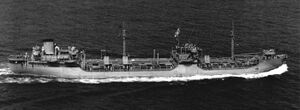Engineering:SS Ideal X
 Plan of the SS Ideal X
Script error: The function "infobox_ship_career" does not exist. | |
| General characteristics | |
|---|---|
| Class and type: | T2-SE-A1 |
| Tonnage: | 16,460 GRT[1] |
| Length: | 524 ft (160 m)[2] |
| Beam: | 30 ft (9.1 m)[2] |
| Height: | 68 ft (21 m)[2] |
| Propulsion: | Elliot Company steam turbine, electric propulsion.[1] |
| Capacity: | |
 The Ideal X was originally constructed as a T2 tanker, similar to the Hat Creek shown here in August 1943.
| |
SS Ideal X, a converted World War II T-2 oil tanker, was the first commercially successful container ship.
Built by The Marinship Corporation during World War II as Potrero Hills, she was later purchased by Malcom McLean's Pan-Atlantic Steamship Company.[3][4][5] In 1955, the ship was modified to carry shipping containers and rechristened Ideal X. During her first voyage in her new configuration, on April 26, 1956,[6] the Ideal X carried 58 containers from Port Newark, New Jersey, to Port of Houston, Texas , where 58 trucks were waiting to be loaded with the containers.[7] It was not the first container ship, however. The Clifford J. Rodgers, operated by the White Pass and Yukon Route, made its debut in 1955.
In 1959, the vessel was acquired by Bulgarian owners, who rechristened her Elemir. The Elemir suffered extensive damage during heavy weather on February 8, 1964, and was sold in turn to Japanese breakers. She was finally scrapped on October 20, 1964, in Hirao, Japan.
Notes
- ↑ 1.0 1.1 1.2 Cite error: Invalid
<ref>tag; no text was provided for refs namedcud290 - ↑ 2.0 2.1 2.2 Cite error: Invalid
<ref>tag; no text was provided for refs namedcud31 - ↑ "Marinship". http://www.t2tanker.org/ships/marin.html.
- ↑ "THe JoC: 175 Years of Change". Archived from the original on 2007-09-15. https://web.archive.org/web/20070915093922/http://www.joc.com/history/p15.asp.
- ↑ Cudahy, 2006.
- ↑ "The Port Authority of New York and New Jersey - Press Release". http://www.panynj.gov/abouttheportauthority/PressCenter/PressReleases/PressRelease/index.php?id=812.
- ↑ Levinson, 2006, p.1.
References
- Cudahy, Brian J. (2006). Box boats: how container ships changed the world. New York: Fordham University Press. ISBN 0-8232-2568-2.
- Cudahy, Brian J. (September–October 2006) "The Containership Revolution: Malcom McLean's 1956 Innovation Goes Global" TR News (Washington, D.C.: Transportation Research Board of the National Academies) 246: 5–9 http://onlinepubs.trb.org/onlinepubs/trnews/trnews246.pdf. Retrieved 2011-03-01.
- Levinson, Marc (2006). The Box: How the Shipping Container Made the World Smaller and the World Economy Bigger. Princeton, N.J: Princeton University Press. pp. 1. ISBN 0-691-12324-1.
External links
- Vessel data at Dept. of Transportation (Link Broken)
- April 26, 1956: The Container Ship's Maiden Voyage
